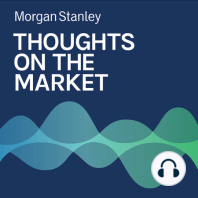3 min listen

Michael Zezas: Infrastructure SuperCycle on the Horizon?
Michael Zezas: Infrastructure SuperCycle on the Horizon?
ratings:
Length:
3 minutes
Released:
Oct 21, 2021
Format:
Podcast episode
Description
The bipartisan infrastructure and ‘Build Back Better’ plans remain in legislative limbo, but what could their passage mean for markets? ----- Transcript -----Welcome to Thoughts on the Market. I'm Michael Zezas, Head of Public Policy Research and Municipal Strategy for Morgan Stanley. Along with my colleagues bringing you a variety of perspectives, I'll be talking about the intersection between U.S. public policy and financial markets. It's Wednesday, October 20th at 11:00 a.m. in New York. We spend a lot of time here thinking through exactly how and when Congress will manage to raise the debt ceiling, keep the government open and pass a multitrillion dollar package of spending offset by tax hikes. To be clear, we continue to think it will do all of the above. But for this week, let's deal with DC's policy choices in classic Morgan Stanley Research fashion... by focusing on tangible market impacts. Let's start with new government spending, which can be a positive catalyst in equity sectors such as construction and clean tech: in our view, a conservative estimate is that Congress approves $2.5T over 10 years between both the bipartisan infrastructure and build back better plans. While that amount might fall short of the numbers you might have heard thrown around, it should get your attention. For example, the bipartisan infrastructure framework, which would make up about $500B of this total, would nearly double the US's current baseline infrastructure spend. Our colleagues think this would catalyze an infrastructure ‘supercycle’ where factors like a surge in cement demand could lead to a positive rerating of stocks in the construction sector. Additionally, the framework could include $500B in new spending and tax credits aimed at clean energy production. That means a substantial ramp in demand for clean tech companies, which our colleague Steven Byrd sees as a clear bullish catalyst for that sector. As for corporate taxes - yes, DC is likely to push them higher. Yet for now, we don't see this as more than a near-term challenge that shouldn't get in the way of the positive medium-term outcomes for the equity sectors we've highlighted. As Mike Wilson and the Equity Strategy Team have argued, enacting higher taxes could bring down forward guidance, something investors may not yet be pricing in, given current valuations. In the near term, that may prompt U.S. equity indices to price in a greater chance of a sustained economic slowdown. But such weakness would likely be more of a correction than a bear market signal, as we expect the total fiscal package would ultimately be GDP supportive. Likely incorporating more spending than taxes, our economists expect it to boost net aggregate demand and support the view that the US can continue to grow at a brisk pace in 2022. So, of course, we'll be tracking these policy paths into year end, but it's important to keep an eye on why they matter from a market perspective. We'll stay focused on what's going on, and what you can do about it in your portfolio. Thanks for listening. If you enjoy the show, please share Thoughts on the Market with a friend or colleague or leave us a review on Apple Podcasts. It helps more people find the show.
Released:
Oct 21, 2021
Format:
Podcast episode
Titles in the series (100)
Mike Wilson: Are U.S. Economic Indicators Flashing Yellow? by Thoughts on the Market